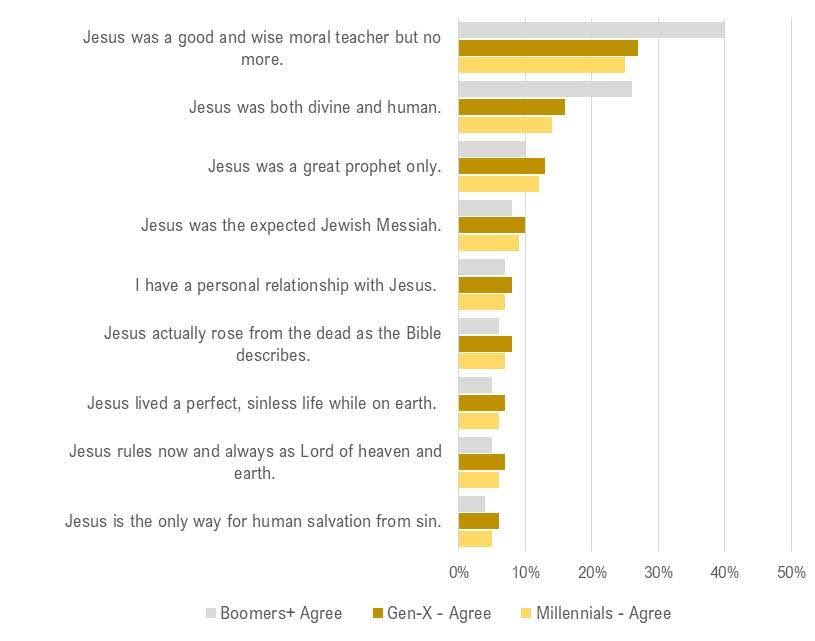Christians worldwide still celebrate Jesus’ birth at Christmastime, and many Americans still consider Jesus to be the most important person in their lives. They love him, worship him, and try to follow his example. Contrast this with the Nones, those who say they have no religion or are not religious people. This segment of American society is 27% of the population and growing. When the Nones think about Jesus, who do they believe he was?
The American Beliefs Study asked a carefully designed, representative sample of 15,000 Americans about their beliefs, including a set of nine statements about the person of Jesus. Their responses reveal that what comes to mind for them is seriously different from what Christians believe and provides helpful cues about sharing the Gospel with Nones this Christmas.
Who Was Jesus? Who Cares?
Participants in the American Beliefs Study, including 3,889 Nones, were presented with a set of statements about Jesus. For Figure 9.2, the researchers combined responses of “Strongly agree” and “Somewhat agree” as “Agree,” and likewise for the “Disagree” options. The middle option shows as “No opinion” below.

American Beliefs Study, 2021
The Nones were most likely to agree that Jesus was just a man, not God incarnate. Three in ten agreed he was “a good and wise moral teacher” ( 29%), while one in seven said Jesus was just a great prophet (16%). These percentages are too low to say most of the Nones think this way. In fact, one in eight of the Nones agreed that “Jesus was both divine and human” (13%). Most of the Nones don’t believe Jesus was God but a few of them do. The most prevalent view among the Nones about Jesus is that they have no opinion on him.
Few of the Nones agree on these statements. Far more of them disagree. Excluding the item about their personal relationship with Jesus, the Nones disagreed about these statements far more often than they agreed – 37.5% on average vs. 11.8%. Over 45% of them disagreed with four of the statements. All in all, the Nones found it much easier to disagree about who Jesus was than to agree.
Most of the Nones have stronger opinions about who Jesus was not than who they believe Jesus was.
Furthermore, the statements that the Nones disagreed with the most were the ones that are consistent with the Christian faith. Specifically:
- 27% disagreed that “Jesus was the expected Jewish Messiah.”
- 36% disagreed that “Jesus was both divine and human.”
- 45% disagreed that “Jesus lived a perfect, sinless life while on earth.”
- 47% disagreed that “Jesus actually rose from the dead as the Bible describes.”
- 47% disagreed that “Jesus rules now and always as Lord of heaven and earth.”
- 55% disagreed that “Jesus is the only way for human salvation from sin.”
Clearly, the Jesus of the Nones is not the Jesus of the Bible.
Beyond that, beliefs among the Nones don’t cluster strongly around any alternative concept of Jesus. The highest agreement for a secular notion of Jesus was 29%. So a large percentage of the Nones stand in clear disagreement with Christian ideas about Jesus, while relatively few of them have landed on any clear, non-Christian idea about him.
As seen for views about God in an earlier post, the Nones are unlikely to agree on a biblical view of Jesus and more likely to disagree, but the highest levels of response went to a third option, “No opinion.” This was the prevailing view regardless of whether a statement reflected a Christian viewpoint or not, with at least 40% of the responses for any one statement and an average of over 50%.
In general, when it comes to questions about Jesus, the favorite response of the Nones is, “I have no opinion on that.”
Does this result show ambivalence or indifference?
Perhaps many of the Nones who ticked “no opinion” about Jesus being both divine and human were actually expressing their ambivalence, that is, “I don’t want to say yes, but I also don’t want to say no.”
On the other hand, the Nones who selected “no opinion” could have been sharing their indifference. Perhaps these high percentages for “no opinion” actually mean “I don’t really care,” or “this is not important to me, one way or the other.” People are more likely to have definite opinions on topics they consider important or relevant to themselves. This makes a good case for the Nones being more indifferent than ambivalent about these statements.
The challenge in coaching unbelievers is not in getting them to think about Jesus in the right way. It is in getting them to think about Jesus at all.
For Christians, Jesus and the gospel are profoundly important and relevant. He is central to everything we face in this life, and our sole source of hope for the life to come. It’s not easy for us to relate to people who respond with a shrug when asked to think about Jesus. Imagine a believer presenting Jesus to a non-believer and hearing the response “I couldn’t care less” instead of a forceful “I disagree.” This reality calls for a witness that starts at a different place, and that starts with making a case for the relevance, importance, and significance of Jesus Christ for life today.
The Nones Do Not Think Alike
So, relatively small percentages of Nones in the Study agree on any statement about Jesus. And even though larger percentages disagreed that they believed these things about him, none of them rose to a level we might call a supermajority (e.g., two-thirds).
The Nones do not think alike, and specifically, it is instructive to see how they differ in their ideas about Jesus between generations. Do younger Nones and older Nones believe differently about Jesus? It’s an important question because if the Church expects Nones to reconsider what they believe about Jesus, it’s helpful to first know what they presently believe. Approaching older Nones in a certain way might get nowhere with younger Nones, and vice-versa.
The American Beliefs Study found it useful to apply the generational framework used by the Pew Research Center, among others. In Figure 9.5, the few Silent generation respondents have been added to the Boomer response, and Gen-Z with the Millennials. Also in Figure 9.5, responses of “Strongly agree” and “Somewhat agree” were combined into “Agree.”

American Beliefs Study, 2021
Levels of agreement among Boomer Nones stand out from the pack for their significantly higher agreement for statements on opposite ends of the belief spectrum. They mostly agreed that Jesus was only a good and wise moral teacher, and nearly as many agreed that Jesus was both divine and human. Let’s presume that these two groups didn’t overlap!
First, 40% of Boomer Nones agreed that “Jesus was a good and wise moral teacher but no more.” That compares with agreement from only 25% of Millennial Nones and 27% of Gen-X Nones. If Jesus was not the person the New Testament says he was, who was he? Younger Nones were far less confident about any alternative idea of Jesus than Boomer Nones. While far from a majority, the 40% agreement is a significant proportion of the Boomer Nones who agreed with Jesus as being just a good and wise teacher.
“Everyone at least believes Jesus was a good and wise moral teacher, right?” Unfortunately, no.
Only about one in four Millennials and Gen-Xer Nones were willing to agree Jesus was a good and wise moral teacher only, as were 40% of Boomers. Is this somewhat encouraging? If four in ten Boomers see Jesus as a “good and wise moral teacher,” might they be interested to learn more about what he taught? Perhaps, but this isn’t a huge open door. Christians can be all the more disappointed that so few Millennial and Gen-X Nones were willing to agree with this limited positive view of Jesus.
Second, 26% of Boomer Nones agreed with the statement, “Jesus was both divine and human,” as against only 14% of Millennials and 16% of Gen-Xers. This finding fits poorly against the good and wise teacher only statement. Generally, Nones of all generations are more inclined to reject Jesus’ divinity than to accept it.
Still, more Boomer Nones are willing to declare their opinion on Jesus for one side or the other, compared to the Nones in younger generations. Maybe Boomer Nones have invested more time and attention to the question of Jesus and who he was, and more of them have formed opinions on this, as against Millennial and Gen-Xers. It is still true that “No opinion” is the favorite response on most of these statements, among all three age cohorts, but the Boomer Nones stand apart from the others, to some extent.
Consider the following set of historical, biblical statements about Jesus measured in the Study:
- He was the expected Jewish Messiah.
- He actually rose from the dead as the Bible describes.
- He lived a perfect, sinless life while on earth.
- He rules now and always as Lord of heaven and earth.
- He is the only way for human salvation from sin.
Very few Nones, of any age, agree with these Christian teachings about Jesus. Specifically, none of them earned even 10% agreement from any of the age groups, except for Gen-X with the statement “Jesus was the expected Jewish Messiah.”
On the other hand, not one of these statements drew a blank from the Nones in any generation. All of them earned at least five percent agreement except for Boomers affirming “Jesus is the only way for human salvation from sin” at just four percent. So though the Nones, in general, reject Christian ideas about Jesus, there are at least some who agree, in all age cohorts.
But consider the Gen-Xers: these Nones consistently agreed at a slightly higher level than other generations with the statements about Jesus that fit the biblical Christian framework. Though still under 10% in all cases except the ‘salvation from sin’ statement, it is notable that they always agreed more than older and younger Nones. This points to a slim edge of opportunity that the Church can prayerfully approach.
Slightly more Gen-X Nones agree with Christian concepts of Jesus compared to older and younger Nones.
The Apostle John wrote of Jesus: “The true light, which gives light to everyone, was coming into the world. He was in the world, and the world was made through him, yet the world did not know him” (John 1:9-10 ESV).
The world did not know him. The heart of the Christian message is to know, accept and believe in Jesus. He is what the Church has to offer the world. It is no small challenge to present the truth about Jesus in a way that the Nones will find engaging and convincing.
But when it happens, the wonderful truth is, “But to all who did receive him, who believed in his name, he gave the right to become children of God” (John 1:12 ESV).
Key Findings:
- Many of the Nones believe Jesus was only a human, but not a majority of them, and 13% believe he was both divine and human.
- In general, the Nones disagree with what the Church teaches about Jesus, but they don’t agree on any alternative concept of who he was.
- Most of the Nones have no real opinion about Jesus; overall, they tend to be indifferent.
- Compared to other generations of Nones, Boomers are more likely to see Jesus as a good and wise moral teacher only, and also to see him as both divine and human.
- And compared to older and younger Nones, Gen-X Nones are slightly more likely to agree with some biblical views of Jesus.
Ideas for Your Church:
- Christmas is the perfect time to focus on beliefs about Jesus because it’s a holiday all about him. When training Christian believers in apologetics, it’s important to not just teach the reasons for believing Jesus was the Son of God, but to teach the reasons why it’s important to think or talk about Jesus at all.
- Especially during Christmastime, understand that most of those outside the church have given little attention to why Jesus matters. In evangelism and outreach, use every tool possible to draw attention to the centrality of Jesus in the Christian faith, and to encourage nonbelievers to reflect on him.
- For the younger Nones, recognize and take heart in the fact that most of them do not have firm opinions about Jesus one way or the other. More than one might expect, this group could be especially open to hearing and learning about Jesus and his message of hope and reconciliation.
This online study among 14,942 American adults was conducted by Campbell Rinker for ACST from October 2020 through February 2021. Results were balanced by US region, 19 ‘Mosaic’ demographic clusters from Experian, and weighted by age to align with known population characteristics. The study carries a maximum margin of error of ±1.97% at the 95% confidence level within any US Census region. A comparative 2017 study involved the same size audience.
Dirk is president and CEO of Campbell Rinker, which has been a leading market research firm for nonprofits since the early 1990s. He has designed and implemented research projects for hundreds of ministries, charities, universities, and museums in the U.S. and internationally—helping clients understand and act on the attitudes, motivations, and perceptions of their valuable constituencies.
Michael is a researcher, writer, and consultant to nonprofits. He and his wife were missionaries for 33 years, serving in Singapore, Virginia, Los Angeles, and England. Most of his ministry has been in global mission research. He has studied, and written on, growth trends among tens of thousands of Christian denominations, globally.




